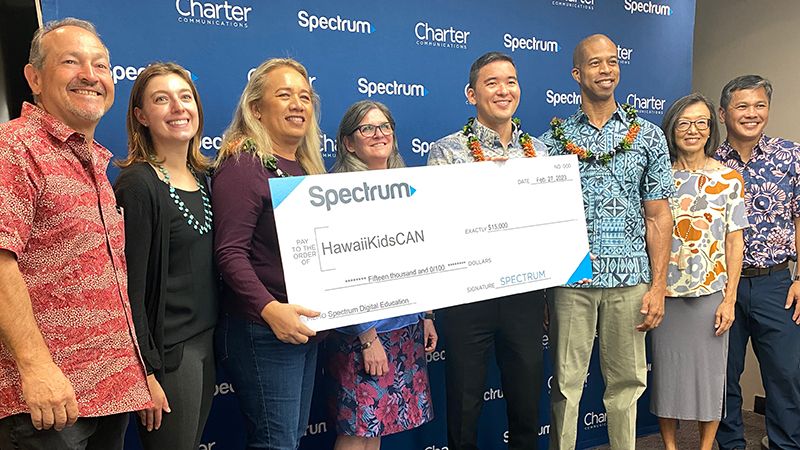HONOLULU — Spectrum on Monday presented a check for $15,000 to David Sun-Miyashiro, executive director of the nonprofit HawaiiKidsCAN, at its Honolulu office.
The grant is part of Spectrum’s six-year, $8 million commitment to promote digital education and broadband technology to communities nationwide through its Spectrum Digital Education program.
“HawaiiKidsCAN launched in 2017. The No. 1 thing we want is more innovation and equity in our education system,” explained Sun-Miyashiro. “We realize it’s not something you can solve with a magic bullet or just one approach. You’ve really got to tackle it lots of ways, so we work on legislation, thinking about system change. We also roll up our sleeves and work in communities on a wide range of projects from making sure kids can get free internet during the pandemic, to this new program to help address learning loss, to supporting parents to (help them) build and develop skills they need to really advocate for their kids.”
WiFi on Wheels started early on during the pandemic when teachers said the problem wasn’t a lack of devices — it was access to the internet, according to Sun-Miyashiro. Schools had devices for kids to take home, but once at home, they couldn’t access the internet to log into classes and keep up with their peers.
Sun-Miyashiro said they looked at different approaches from around the country, with one model placing WiFi hotspots in vehicles and sending them into communities. The vehicles parked at a central community location such as a community center, a park, a church or anywhere that people could safely gather. The program culminated with 11 WiFi on Wheels sites throughout the state across four islands acting as a free public hotspot in communities for kids to use.
“The fun by-product for us is we’ve seen this multi-generational use of the technology where kids may be at the park playing, and then alternate and getting their homework done,” said Sun-Miyashiro. “And the parents can be on their devices working and getting things done too. It’s really a fun way for us to involve the whole family and the importance of having an internet connection.”
Teachers, parents and students struggled after COVID-19 resulted in school closures. It took a while, but schools gradually conducted classes via Zoom or other online meeting methods. Still, it was a struggle for kids who didn’t have internet access. Now, teachers and students are still struggling to get back on track.
“The pandemic, unfortunately, really threw off the trajectories of a lot of kids; it’s had a huge impact on student achievement,” said Sun-Miyashiro. “Many kids are struggling to get caught up and stay at grade level.”
Though not every community has the resources or professionals who can provide tutoring support, Sun-Miyashiro said, “That’s one of the beautiful things about technology. It can bring those resources and services to kids no matter where they are, as long as they have an internet connection.”
That was the start of the Hawaii Tutoring program.
“It’s through the support of the Spectrum Digital Education grant that we can launch it (the program) and make it cost-free for so many families,” said Sun-Miyashiro during the presentation. He explained that the official Department of Education vendor, Air Tutors, selects high-quality tutors from across the country and Hawaii as well. Scheduling is set at a convenient time for students who can either choose to stay after school or have a session at home either before or after dinner.
“If you need one of our WiFi sites, we’re making sure those things are connected,” he said. And all of it is 100% free for families.
State Sen. Lynn DeCoite is aware of the disparities many families face. She previously served in the Hawaii House of Representatives representing District 13 (areas of Maui, Kahoolawe, Lanai, Molokai and Molokini), then was appointed to fill the Hawaii State Senate District 7 vacancy when Sen. J. Kalani English retired in April 2021. She currently represents Hana, East and Upcountry Maui, Molokai, Lanai and Kahoolawe.
“You know, (it’s important) our kids in those areas, rural, underserved, socially disadvantaged, have the same opportunities and resources,” said DeCoite. “What a great partnership between Spectrum and HawaiiKidsCAN. We’ve been struggling throughout the DOE system. We’ve dealt with COVID with either just no service or being bogged down. A lot of those areas … when we finally had the opportunity, people were taking the batteries and stuff, so we couldn’t use WiFi connections.
“This is so huge,” DeCoite added. “My area is probably one of the most remote, most isolated areas without connection. I cannot tell you how grateful we are with the partnerships involved in making sure kids have those opportunities for the resources.”
She said her district alone has about 50,000 constituents, so the number of families and kids who will benefit, especially as more sign on to the program, will be extended.
Spectrum Digital Education launched in 2017 and has funded 99 nonprofit organizations across the country with various grant size awards. Nonprofit organizations must have an online program focused on serving families, seniors or communities in need.
Charter Communications owns Spectrum, a broadband and cable company, and Spectrum News.



